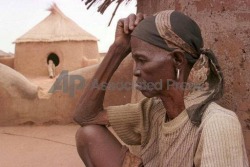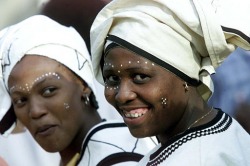Gender Inequality

Cara Fahy
May 17, 2009
World History- Hjelmgren
Period 4
Ghana’s Gender Inequality Struggles
“Gender Inequality remains one of the central challenges of the twenty first century” (Greenstreet, Miranda). Currently, many women in Ghana, and around the world, are mistreated because of their gender, and are not getting sufficient support from their government. It puzzles many that, even when the Ghanaian government is getting so much financial help from outside aid to help their women, there still seems to be little to no changes being made. Ghana needs to start using what they have to start making changes towards their goal, of gender equality by 1215. Ghana has everything to reach gender equality, yet there seems to be no changes being made towards this goal.
Ghana has all the necessities to make change. According to Dr. Mensah-Kutin, Ghana receives over 70 percent of its budget from outside aid. If one nation were supplied with such a great percent of funds, without even having to use their own resources, one would think that there would be changes. Even so, there has been no change (Mcelfresh, Jessica & Achiaa, Ama). One would say, such as Ms. Kathy Cusack wondered; “What is aid doing? Where is it going?”. Along with having the financial resources to make a difference, the Ghanaian people have the first key step in trying to change; they have a goal. Without a goal they have to particular drive to make the changes. If they did not have their goals, it is very likely they would not even be advocating for gender equality (Osabutey). The Ghanaian people obviously want change. We see this through the goal that they set for themselves, and the initiative that they took to move forward.
Although they have everything to take steps forward, they are still not using these resources and making the necessary changes. Kathy Cusack, of the Network for Women’s Rights in Ghana (NETRIGHT), said that 68 percent of pregnant women in Ghana are malnourished. That is something one would never want to hear, for if the mother is malnourished then the infant death rate rockets, which it has in Ghana (Mukasah). Even though they have the money to provide for these mothers in need, somehow there are still so many being unprovided for. Many would argue that Ghana has only recently realized their problems, and still deserve time to make their changes (Osabutey). Although this is a very valid argument, it is false. During colonization times, women were treated as property to their husbands and didn’t have many rights they have today. Yes, since that time their rights have grown, but they have not grown to the extent of gender equality, or anywhere near there. The Ghanaian Government made their Gender laws on January 2, 1986 (“African Women’s Rights Observatory”). After these laws were ratified, many actually saw a decrease in women’s rights (Mcelfresh, Jessica & Achiaa, Ama). Even if something is written in paper, it has to be reciprocated in action to show effort.
Ghana has addressed the problem, set their goal, and want to change. Even with all of these factors in play for the last twenty years, there has been little changes being made, and very often one see’s a decrease in help, or a statistic they would have seen, right after the colonization throughout Africa (Greenstreet, Miranda). With the reinitiation of their goals in 2007, there is hope that there will be change in the upcoming years, and possibly even reaching their goal in 1215 of gender equality (Cusack, Kathy).
Annotated Citations:
Ghana’s Gender Inequality Struggles
Amankwah, Ama Achiaa & Mcelfresh, Jessica. “Ghana: New Aid Agenda Reinforces Gender Inequality” allAfrica.com. May 13, 2009.
http://allafrica.com/stories/200807110825.html
This cite was so helpful in my research because it gave me a great understanding of the goals of the Ghanaian people and what they are trying to do to change the Gender problems in their country. This site helped me understand what “aid” is and how it is important for the Ghanaians to support women in need.
“CEDAW Convention” African Women’s Right Observatory. My 16, 2009.
http://geoinfo.uneca.org/awro/Convention.aspx?ID=61
This cite gave me a great out look on what the meetings that are going on a lot in Africa to try and reiterate the laws of the women. It gave me such a great visual onto how important this is still in the 21 century.
“Gender Inequality Remains A Challenge of The 21 Century” Ghana. May, 12, 2009.
http://www.ghana.gov.gh/Ghana/gender_inequality_remains_challenge _21_century.jsp
I was able to greatly understand the troubles that the Ghanaian people go through when they are trying to change their gender problems. It gave me a lot of information on how the Gender inequity affects the women in Ghana.
Osabutey, Phyllis. “Ghana: Reaping The Double Divided of Gender Equality”. Women’s International League for Peace and Freedom. May, 12, 2009. http://www.peacewomen.org/news/Ghana/Feb07/GenderEquality.html
This site was great because it gave me the out look of both perspectives of this problem and how each ideas are very valid. This was very important for the formulating of my thesis.
Last updated on May 22, 2009
May 17, 2009
World History- Hjelmgren
Period 4
Ghana’s Gender Inequality Struggles
“Gender Inequality remains one of the central challenges of the twenty first century” (Greenstreet, Miranda). Currently, many women in Ghana, and around the world, are mistreated because of their gender, and are not getting sufficient support from their government. It puzzles many that, even when the Ghanaian government is getting so much financial help from outside aid to help their women, there still seems to be little to no changes being made. Ghana needs to start using what they have to start making changes towards their goal, of gender equality by 1215. Ghana has everything to reach gender equality, yet there seems to be no changes being made towards this goal.
Ghana has all the necessities to make change. According to Dr. Mensah-Kutin, Ghana receives over 70 percent of its budget from outside aid. If one nation were supplied with such a great percent of funds, without even having to use their own resources, one would think that there would be changes. Even so, there has been no change (Mcelfresh, Jessica & Achiaa, Ama). One would say, such as Ms. Kathy Cusack wondered; “What is aid doing? Where is it going?”. Along with having the financial resources to make a difference, the Ghanaian people have the first key step in trying to change; they have a goal. Without a goal they have to particular drive to make the changes. If they did not have their goals, it is very likely they would not even be advocating for gender equality (Osabutey). The Ghanaian people obviously want change. We see this through the goal that they set for themselves, and the initiative that they took to move forward.
Although they have everything to take steps forward, they are still not using these resources and making the necessary changes. Kathy Cusack, of the Network for Women’s Rights in Ghana (NETRIGHT), said that 68 percent of pregnant women in Ghana are malnourished. That is something one would never want to hear, for if the mother is malnourished then the infant death rate rockets, which it has in Ghana (Mukasah). Even though they have the money to provide for these mothers in need, somehow there are still so many being unprovided for. Many would argue that Ghana has only recently realized their problems, and still deserve time to make their changes (Osabutey). Although this is a very valid argument, it is false. During colonization times, women were treated as property to their husbands and didn’t have many rights they have today. Yes, since that time their rights have grown, but they have not grown to the extent of gender equality, or anywhere near there. The Ghanaian Government made their Gender laws on January 2, 1986 (“African Women’s Rights Observatory”). After these laws were ratified, many actually saw a decrease in women’s rights (Mcelfresh, Jessica & Achiaa, Ama). Even if something is written in paper, it has to be reciprocated in action to show effort.
Ghana has addressed the problem, set their goal, and want to change. Even with all of these factors in play for the last twenty years, there has been little changes being made, and very often one see’s a decrease in help, or a statistic they would have seen, right after the colonization throughout Africa (Greenstreet, Miranda). With the reinitiation of their goals in 2007, there is hope that there will be change in the upcoming years, and possibly even reaching their goal in 1215 of gender equality (Cusack, Kathy).
Annotated Citations:
Ghana’s Gender Inequality Struggles
Amankwah, Ama Achiaa & Mcelfresh, Jessica. “Ghana: New Aid Agenda Reinforces Gender Inequality” allAfrica.com. May 13, 2009.
http://allafrica.com/stories/200807110825.html
This cite was so helpful in my research because it gave me a great understanding of the goals of the Ghanaian people and what they are trying to do to change the Gender problems in their country. This site helped me understand what “aid” is and how it is important for the Ghanaians to support women in need.
“CEDAW Convention” African Women’s Right Observatory. My 16, 2009.
http://geoinfo.uneca.org/awro/Convention.aspx?ID=61
This cite gave me a great out look on what the meetings that are going on a lot in Africa to try and reiterate the laws of the women. It gave me such a great visual onto how important this is still in the 21 century.
“Gender Inequality Remains A Challenge of The 21 Century” Ghana. May, 12, 2009.
http://www.ghana.gov.gh/Ghana/gender_inequality_remains_challenge _21_century.jsp
I was able to greatly understand the troubles that the Ghanaian people go through when they are trying to change their gender problems. It gave me a lot of information on how the Gender inequity affects the women in Ghana.
Osabutey, Phyllis. “Ghana: Reaping The Double Divided of Gender Equality”. Women’s International League for Peace and Freedom. May, 12, 2009. http://www.peacewomen.org/news/Ghana/Feb07/GenderEquality.html
This site was great because it gave me the out look of both perspectives of this problem and how each ideas are very valid. This was very important for the formulating of my thesis.
Last updated on May 22, 2009

